Welcome to Your Home for CBT.
Welcome to the Association for Behavioral and Cognitive Therapies (ABCT). For over 50 years, ABCT and its members have strived to alleviate human suffering through the application of scientific principles.
Find a CBT Therapist
Search through our directory of local clinicians.
Find a CBT Therapist
Search through our directory of local clinicians.
Get Help
Resources for individuals and families who are looking for assistance with understanding CBT concerns.
For Professionals
Resources for practicing CBT professionals including clinicians and researchers.
For Students
Resources for those who are studying to become a professional CBT professional.
Behavioral & Cognitive Therapy Resources
Browse through our library of Fact Sheets, Self-Help Books, and other resources.
Fact Sheets
ABCT provides Fact Sheets covering a number of topics.
Self Help Books
ABCT provides Self-Help books covering a number of topics.
Find A Therapist
Search through our directory of local clinicians.
New & Noteworthy
ABCT news and position statements on current events and issues shaping the world around us.
 Kelsie H. Okamura - Kelsie Okamura (she/her) is an Implementation Researcher at the Baker Center for Children and Families, a Harvard Medical School affiliate, and a licensed psychologist.
Kelsie H. Okamura - Kelsie Okamura (she/her) is an Implementation Researcher at the Baker Center for Children and Families, a Harvard Medical School affiliate, and a licensed psychologist.  Ted Gradman - Dr. Gradman (UCLA/Stanford trained) combines CBT and neuroscience to reduce the brain’s alarm function with CBT skills. His San Mateo, CA, practice has helped clients with anxiety, PTSD, depression, neurologic and interpersonal challenges for 33 years.
Ted Gradman - Dr. Gradman (UCLA/Stanford trained) combines CBT and neuroscience to reduce the brain’s alarm function with CBT skills. His San Mateo, CA, practice has helped clients with anxiety, PTSD, depression, neurologic and interpersonal challenges for 33 years. 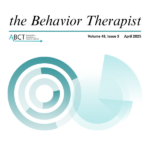 the Behavior Therapist April 2025 - The April issue of the Behavior Therapist covers a range of topics, from reliable treatment change to lab culture to social justice in mental health (op-ed)—including a tribute to Aaron T. Beck.
the Behavior Therapist April 2025 - The April issue of the Behavior Therapist covers a range of topics, from reliable treatment change to lab culture to social justice in mental health (op-ed)—including a tribute to Aaron T. Beck. 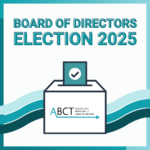 Elections for the 2025 Board of Directors Have Begun - Voting has now begun for the two 2025 open Board of Director positions, and will run until April 30th.
Elections for the 2025 Board of Directors Have Begun - Voting has now begun for the two 2025 open Board of Director positions, and will run until April 30th.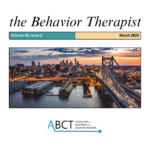 the Behavior Therapist March 2025 - March 2025's tBT highlights six sessions from ABCT's Annual Convention in Philadelphia.
the Behavior Therapist March 2025 - March 2025's tBT highlights six sessions from ABCT's Annual Convention in Philadelphia. ABCT Fireside Chat | February 25, 2025 - Join ABCT President Steve Safren for the first Fireside Chat, an online meeting space open to the entire membership, where the president responded to questions about the Annual Convention and other matters of organizational importance.
ABCT Fireside Chat | February 25, 2025 - Join ABCT President Steve Safren for the first Fireside Chat, an online meeting space open to the entire membership, where the president responded to questions about the Annual Convention and other matters of organizational importance. 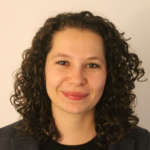 Emily Bibby - Emily Bibby is a doctoral student in the Relationship Development Center at Stony Brook University.
Emily Bibby - Emily Bibby is a doctoral student in the Relationship Development Center at Stony Brook University.  D. Catherine Walker - D. Catherine Walker, Ph.D., is a clinical psychologist licensed in New York State with over a decade of experience providing compassionate therapy to diverse clients.
D. Catherine Walker - D. Catherine Walker, Ph.D., is a clinical psychologist licensed in New York State with over a decade of experience providing compassionate therapy to diverse clients. 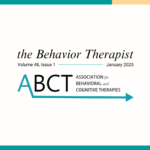 the Behavior Therapist January 2025 - Read the first Behavior Therapist of 2025, available now online.
the Behavior Therapist January 2025 - Read the first Behavior Therapist of 2025, available now online.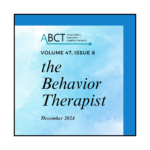 the Behavior Therapist’s December 2024 Issue Is Now Available Online - Volume 47 of the Behavior Therapist wraps up with the 8th issue, released December 2024.
the Behavior Therapist’s December 2024 Issue Is Now Available Online - Volume 47 of the Behavior Therapist wraps up with the 8th issue, released December 2024.Helpful Tips & Featured Articles
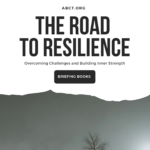 Resilience Briefing Book - The Resilience Briefing Book is a vital resource to communicate with the media and the public at large about the importance of resilience: what it is, why it’s important, and how to harness and promote resilience across the lifespan.
Resilience Briefing Book - The Resilience Briefing Book is a vital resource to communicate with the media and the public at large about the importance of resilience: what it is, why it’s important, and how to harness and promote resilience across the lifespan. CBT for Insomnia with Pain - Recently, findings published in “JAMA Network Open” highlight how combining the two treatments [Cognitive Behavioral Therapy for Insomnia (CBTi) and best-evidence pain management (BEPM)] yielded significant and clinically meaningful changes in nCSP patients facing sleep challenges.
CBT for Insomnia with Pain - Recently, findings published in “JAMA Network Open” highlight how combining the two treatments [Cognitive Behavioral Therapy for Insomnia (CBTi) and best-evidence pain management (BEPM)] yielded significant and clinically meaningful changes in nCSP patients facing sleep challenges.  Receiving CBT as an Older Adult - The Health Medicine Network covered a study published in the Journal of Affective Disorders that examined long-term effects of CBT on disorders in the elderly.
Receiving CBT as an Older Adult - The Health Medicine Network covered a study published in the Journal of Affective Disorders that examined long-term effects of CBT on disorders in the elderly.  Web-Based CBT Shows Effectiveness in Reducing Binge-Eating Episodes - JAMA, the Journal of the American Medical Association, published a study that showcased effectiveness of web-based CBT in reducing binge-eating episodes.
Web-Based CBT Shows Effectiveness in Reducing Binge-Eating Episodes - JAMA, the Journal of the American Medical Association, published a study that showcased effectiveness of web-based CBT in reducing binge-eating episodes. CBT Effective in Treating Nonphysical Aspects of Perimenopause’s Effects - According to a new study conducted by the University College of London, women are 40% more likely to experience depression during the stage of perimenopause compared to those who are not experiencing menopausal symptoms.
CBT Effective in Treating Nonphysical Aspects of Perimenopause’s Effects - According to a new study conducted by the University College of London, women are 40% more likely to experience depression during the stage of perimenopause compared to those who are not experiencing menopausal symptoms.Calendar of Events
Live Webinar May 15 - AI Applications for Training and Therapy: Emerging Technologies and Ethical Considerations with Dr. Betsy Stade and Dr. Shannon Wiltsey Stirman
Event Date: Thursday, May 15 2025
Event Time: 12:00 ET
Get Involved
Join ABCT today to become a part of an active community of CBT Professionals.
Featured Lab
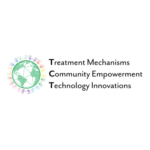 The Treatment Mechanisms, Community Empowerment, and Technology Innovations (TCT) Lab - The Treatment Mechanisms, Community Empowerment, and Technology Innovations (TCT) Lab, located in the Department of Psychology at University of Utah, is directed by Anu Asnaani, Ph.D.
The Treatment Mechanisms, Community Empowerment, and Technology Innovations (TCT) Lab - The Treatment Mechanisms, Community Empowerment, and Technology Innovations (TCT) Lab, located in the Department of Psychology at University of Utah, is directed by Anu Asnaani, Ph.D.Featured Professionals
Showcasing the people and ideas that make our community better for everyone.
Featured Fellow
 Nick Salsman - An interview conducted with ABCT Fellow Nick Salsman, Ph.D., a board certified licensed clinical psychologist and Dialectical Behavior Therapy (DBT)-Linehan Board of Certification clinician... professor and director of the Psychological Services Center (PSC) at Xavier University, a trainer and consultant by Behavioral Tech, a psychologist at the Cincinnati Veterans Affairs Medical Center (VA), and a private practitioner and consultant focusing largely on DBT.
Nick Salsman - An interview conducted with ABCT Fellow Nick Salsman, Ph.D., a board certified licensed clinical psychologist and Dialectical Behavior Therapy (DBT)-Linehan Board of Certification clinician... professor and director of the Psychological Services Center (PSC) at Xavier University, a trainer and consultant by Behavioral Tech, a psychologist at the Cincinnati Veterans Affairs Medical Center (VA), and a private practitioner and consultant focusing largely on DBT.Featured Researcher
 Kelsie H. Okamura - Kelsie Okamura (she/her) is an Implementation Researcher at the Baker Center for Children and Families, a Harvard Medical School affiliate, and a licensed psychologist.
Kelsie H. Okamura - Kelsie Okamura (she/her) is an Implementation Researcher at the Baker Center for Children and Families, a Harvard Medical School affiliate, and a licensed psychologist. Featured Mentor
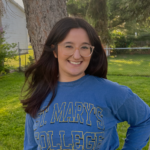 Maria A. Kalantzis - Maria A. Kalantzis (she/her) is a 5th year PhD candidate in clinical psychology with a health psychology specialization at Bowling Green State University.
Maria A. Kalantzis - Maria A. Kalantzis (she/her) is a 5th year PhD candidate in clinical psychology with a health psychology specialization at Bowling Green State University. Featured Therapist
 Ted Gradman - Dr. Gradman (UCLA/Stanford trained) combines CBT and neuroscience to reduce the brain’s alarm function with CBT skills. His San Mateo, CA, practice has helped clients with anxiety, PTSD, depression, neurologic and interpersonal challenges for 33 years.
Ted Gradman - Dr. Gradman (UCLA/Stanford trained) combines CBT and neuroscience to reduce the brain’s alarm function with CBT skills. His San Mateo, CA, practice has helped clients with anxiety, PTSD, depression, neurologic and interpersonal challenges for 33 years. ABCT Community
Be a part of our online community on social media and in our Member Forums.






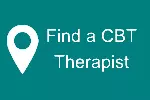
 Subscribe to ABCT
Subscribe to ABCT